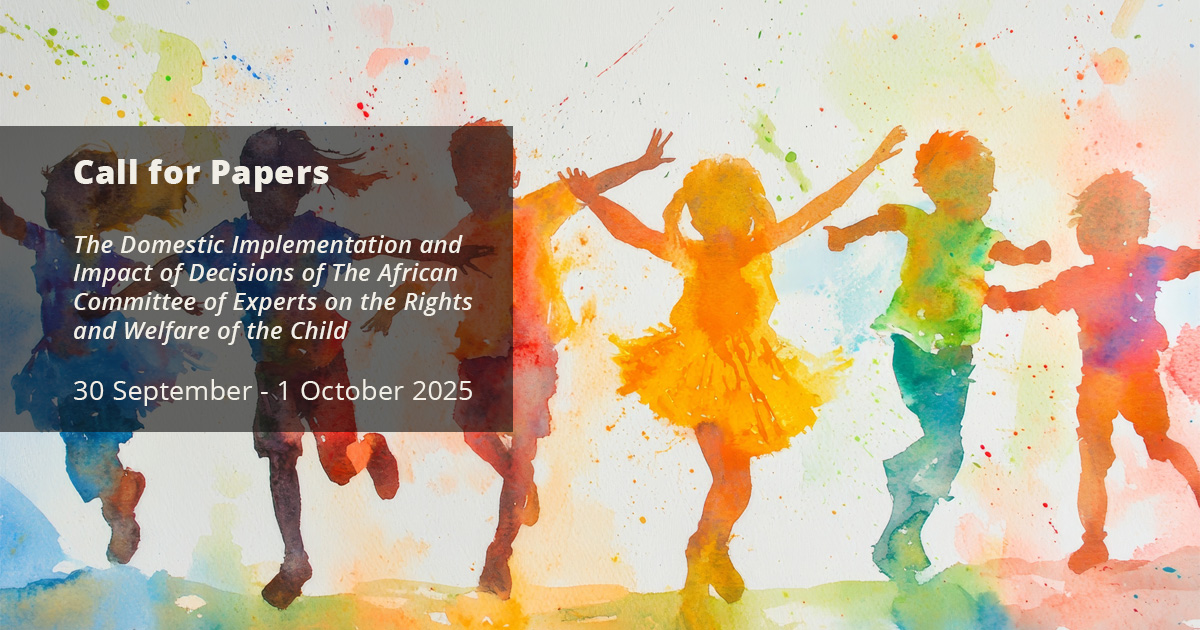The Centre for Human Rights, Faculty of Law, University of Pretoria is accepting abstracts on the Domestic Implementation and Impact of Decisions of The African Committee of Experts on the Rights and Welfare of the Child. Accepted papers will be presented at a two-day conference on 30 September – 01 October 2025, to deliberate on the state of implementation of the decisions of African Children’s Committee and to consider pathways for improved domestic implementation of decisions.
One of the main challenges facing the African Union human rights system is that, although more states have ratified the core human rights treaties, there is still little commitment of states to fulfilling the obligations under these treaties. This is especially evident in the context of decisions (as broadly defined to include recommendations, findings, concluding observations, and decisions on communications) of the bodies mandated to monitor the implementation of these treaties, namely the African Court on Human and Peoples’ Rights, the African Commission on Human and Peoples’ Rights and the African Committee of Experts on the Rights and Welfare of the Child (African Children’s Committee).
On its part, the African Children’s Committee has adopted some measures to ensure effective monitoring and follow-up on its decisions and recommendations. These measures include requiring states to submit reports on the implementation of decisions; holding implementation hearings; undertaking country visits to follow up on implementation; engaging states on implementation during state reporting dialogues; requesting information on implementation of previous recommendations in the case of concluding observations; and highlighting the status of implementation in its Activity Reports to the AU Executive Council. The Committee has also enhanced engagements with national human rights institutions (NHRIs) and civil society organisations (CSOs) to mobilise them to support monitoring of implementation. The African Children’s Committee’s Working Group on Implementation of Decisions has developed guidelines for assessing the status of implementation of decisions. Further, at its 45th Ordinary Session in April 2025, the African Children’s Committee launched a study on the implementation of its decisions, which detailed the implementation and follow-up mechanisms, assessed the extent of implementation of communications, and made recommendations to enhance implementation of the African Children’s Charter and the decisions and recommendations of the Committee.
Despite these efforts, the African Children’s Committee notes enduring challenges to effective implementation of its decisions and recommendations. The challenges are underpinned by factors such as inadequate resources to facilitate monitoring of implementation; conflict and instability in state parties which affects follow-up; the existence of several layers of actors which complicates the follow-up; the lack of national mechanisms for reporting and follow-up at the domestic level; the refusal or failure by some states to engage with the bodies and to integrate the decisions in national action plans, strategies, and budgeting processes; and the lack of evidence-based information.
Scope and themes
The Centre for Human Rights, University of Pretoria will host a two-day conference on 30 September – 01 October 2025, to deliberate on the state of implementation of the decisions of African Children’s Committee and to consider pathways for improved domestic implementation of decisions.
To inform the deliberations at the conference, the Centre is calling on researchers to submit abstracts (and ultimately papers) for presentation at the conference. Researchers may submit abstracts in the following thematic areas:
- A systematic analysis of implementation of decisions in any specific country / multiple countries/sub-region.
- Case study on implementation of specific decisions of the African Children’s Committee.
- Focus on success and challenges in the implementation and monitoring of decisions on specific articles of the African Children’s Charter.
- Mapping and analysing the role and contribution of specific actors in implementing and monitoring the implementation of decisions, such as the legislature, judiciary, executive, NHRIs, academia and CSOs at the national level, or relevant institutions at the sub-regional and regional levels.
- Case studies of successful implementation or monitoring with the potential for transferability and scale-up.
- Comparative studies on the implementation of the decisions of comparable bodies.
Submission of abstracts
Interested participants are invited to submit an abstract of no more than 500 words by 30 June 2025. The abstract should highlight the key findings, innovations, unique insights, and the prospective recommendations of the proposed paper.
Abstracts should be submitted to:
- Ms. Ntokozo Sibanyoni at ntokozo.sibanyoni@up.ac.za copying
- Mr Brian Kibirango at brian.kibirango@up.ac.za
The outcome of the review of abstracts will be communicated by 10 July 2025, and authors will be invited to submit, by 30 August 2025, a full paper of no more than 8000 words.
Authors whose papers are accepted will be facilitated to attend the conference in accordance with University of Pretoria travel policies.
Publication
Papers presented at the conference will be considered for further development and publication in a peer reviewed publication.
For more information, please contact:
Ntokozo Sibanyoni
Junior Project Administrator Project Officer
ntokozo.sibanyoni@up.ac.za
Ruth Versfeld
Project Officer
ruth.versfeld@up.ac.za


